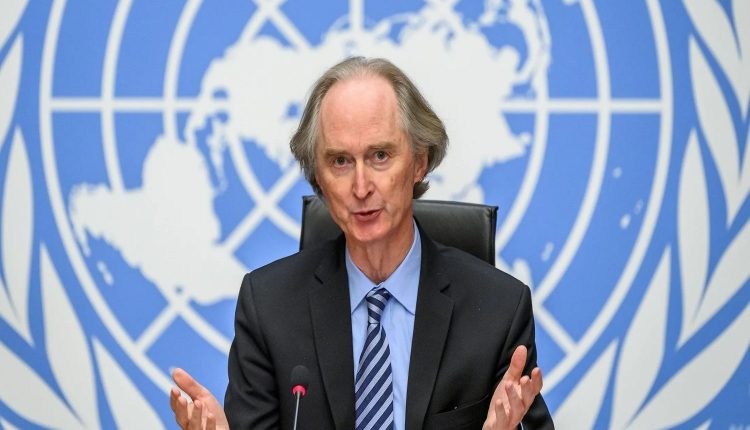UN Envoy Pedersen Calls for Urgent Syria Talks in Geneva
DAMASCUS, Syria (North Press) – UN Special Envoy for Syria, Geir Pedersen, announced on Saturday a new push for political negotiations in Geneva aimed at resolving the prolonged Syrian conflict through a structured political transition.
Pedersen, who visited Damascus last month, emphasized the urgency of implementing United Nations Security Council (UNSC) Resolution 2254, which outlines a roadmap for peace and political transition in Syria. “I have invited all parties to urgent political talks in Geneva to begin this process,” Pedersen said, adding that the invitation has been accepted by all sides involved.
This marks a critical moment in the stalled Syrian peace process, as previous efforts, including eight rounds of the Constitutional Committee talks, have failed to yield significant progress.
Background on the Stalemate
The Constitutional Committee, formed in 2019 to draft a new Syrian constitution, last convened in Geneva between May 30 and June 3, 2022. However, deep divisions among the participants – representatives of the Syrian government, opposition, and civil society – have stalled further progress.
Damascus and its ally Moscow have resisted holding the ninth round of talks in Geneva, questioning its neutrality. Earlier this year, Pedersen proposed Riyadh as an alternative venue, but the suggestion did not materialize.
Pedersen stated, “We need a serious, urgent process that is fundamentally different from past attempts. This should be the beginning of a pathway to meet the legitimate aspirations of the Syrian people.”
The Current Context
The call for renewed talks comes amidst escalating tensions across Syria, with military operations in the northwest and an economic crisis exacerbating the suffering of millions. Pedersen urged all parties to prioritize de-escalation and civilian protection in accordance with international humanitarian law.
The humanitarian situation in Syria remains dire, with over 14 million people in need of assistance. Additionally, the recent sharp decline of the Syrian pound against the dollar has compounded economic hardships, leading to skyrocketing prices for basic goods and services.
Pedersen highlighted the need for “immediate and credible transitional arrangements in Syria,” pointing to a window of opportunity to reset the course of the peace process.
The Road Ahead
The upcoming Geneva talks aim to tackle core issues outlined in UNSC Resolution 2254, including the drafting of a new constitution, holding free and fair elections under UN supervision, and establishing transitional governance.
Analysts believe the inclusion of all major stakeholders, including regional powers, could determine the success or failure of the negotiations.
However, skepticism persists. Previous rounds of talks have been marred by delays, walkouts, and an apparent lack of political will from key players. The Syrian government has repeatedly insisted on sovereignty and non-interference, while opposition groups demand significant concessions, including the release of political detainees.
A Long Road Ahead
While Pedersen’s push for Geneva talks has generated cautious optimism, achieving meaningful outcomes remains a tall order. The Syrian conflict, now in its 14th year, has left over 500,000 dead, displaced millions, and devastated the country’s infrastructure.
Experts warn that without sustained international pressure and compromise among the conflicting parties, even this new initiative might falter.
“This is a critical moment,” Pedersen concluded. “The urgency to act has never been greater, and the Syrian people cannot afford further delays in resolving this devastating conflict.”
On Nov 25, Pedersen met with Syrian Minister of Foreign Affairs and Expatriates, Bassam Sabbagh, to discuss the resumption of the constitutional committee’s work.

